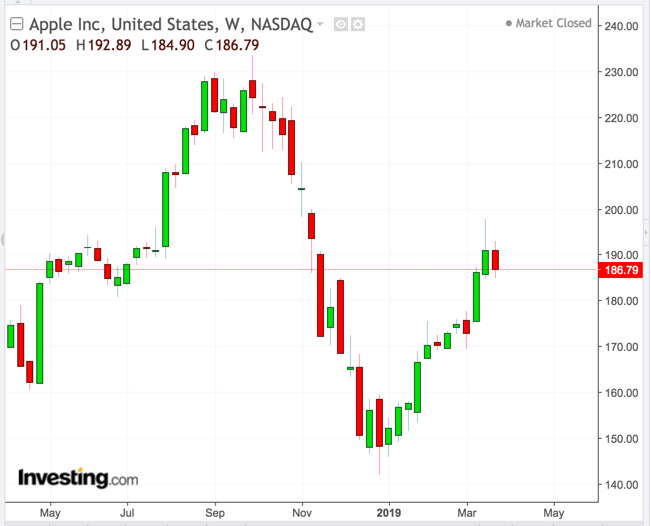Apple (NASDAQ:AAPL) offered its bulls some powerful ammunition this week. The maker of the popular iPhone showed how it can use its massive base of customers to unlock new areas of growth when demand for its flagship products is weakening.
In a major shift to its growth strategy, Apple on Monday unveiled a suite of new services, including a new video-subscription service which will carry its original content; an Apple credit card in partnership with Goldman Sachs Group (NYSE:GS); a news app providing access to 300-plus magazines as well as newspapers, and a gaming subscription service offering access to 100-plus exclusive games. Aiming to disrupt a host of different industries, Apple is showing it hasn’t yet finished its super growth cycle and it is ideally positioned to use its 1.4-billion active installed base to diversify its revenue.
The most important part of this strategic shift is Apple’s foray into the highly competitive video-streaming service arena, where it will be competing with the much established rival, Netflix (NASDAQ:NFLX) and traditional media operators, such as Disney (NYSE:DIS). Apple TV Plus will be ad-free, available on demand, and viewable both online and offline.
Apple plans to launch it in over 100 countries this fall. So far, it hasn’t disclosed how much it will charge for the service.
On the consumer finance side, Apple Card won’t have common charges such as annual, foreign-transaction and late fees, further increasing the appeal of its Apple Pay feature.
No Longer Just About iPhones
Apple’s new moves are consistent with our view that Apple isn’t just about iPhones and that it has a lot of options at its disposal to arrest a slowdown in its hardware business. With this optimistic outlook, the biggest question for investors, however, is whether they should remain loyal to Apple shares when its CEO Tim Cook is making the biggest bet of his career after Steve Jobs’ death in 2011?
The company's stock, after touching a record high of $233.47 in October, has fallen about 18%, underperforming the S&P 500. In the last month, however, it's gained 7.5% and is up 8% over the past year. The shares closed yesterday at $186.79.

Given the momentum Apple's services unit has shown during the past five years, we believe Apple is on the right track and long-term investors will be rewarded for their patience. The company’s services, which includes Apple Music, movie rentals and app downloads, produced 33% growth last year with sales touching $40 billion—accounting for about 15% of the company’s total of $265.6 billion.
That contribution to Apple’s total sales, according to an estimate by Morgan Stanley, will continue to grow and could generate about 60% of Apple’s revenue in the next five years.
No doubt, Apple’s journey to make services business its top revenue generator won’t be an easy one. It’s entering the media entertainment game at a time when Netflix has won 139 million global subscribers through its enticing content, while Disney, which has decades of experience making hit shows and movies, plans to launch its own streaming service later this year, armed with its newly acquired Time Warner’s media assets.
But what makes Apple different is the company’s deep pockets and its highly loyal customer base. A slowdown in the company’s iPhone business doesn’t mean that the smartphone industry is dying. Even if we assume that Apple has seen the best days of its iPhone growth, it will still be a great cash-cow business, providing Apple a wide economic moat to branch out to other areas.
Bottom Line
For long-term investors whose objective is to earn a decent return through dividends and capital appreciation, we find Apple a very suitable candidate. The company is returning more and more cash to investors in the form of dividends and share buybacks.
Slowing iPhone sales and the company’s investments to accelerate growth in its services business might keep the stock depressed in the short-run, but we think investors will be better off remaining invested to capture the upside that will come with its renewed focus on services.
